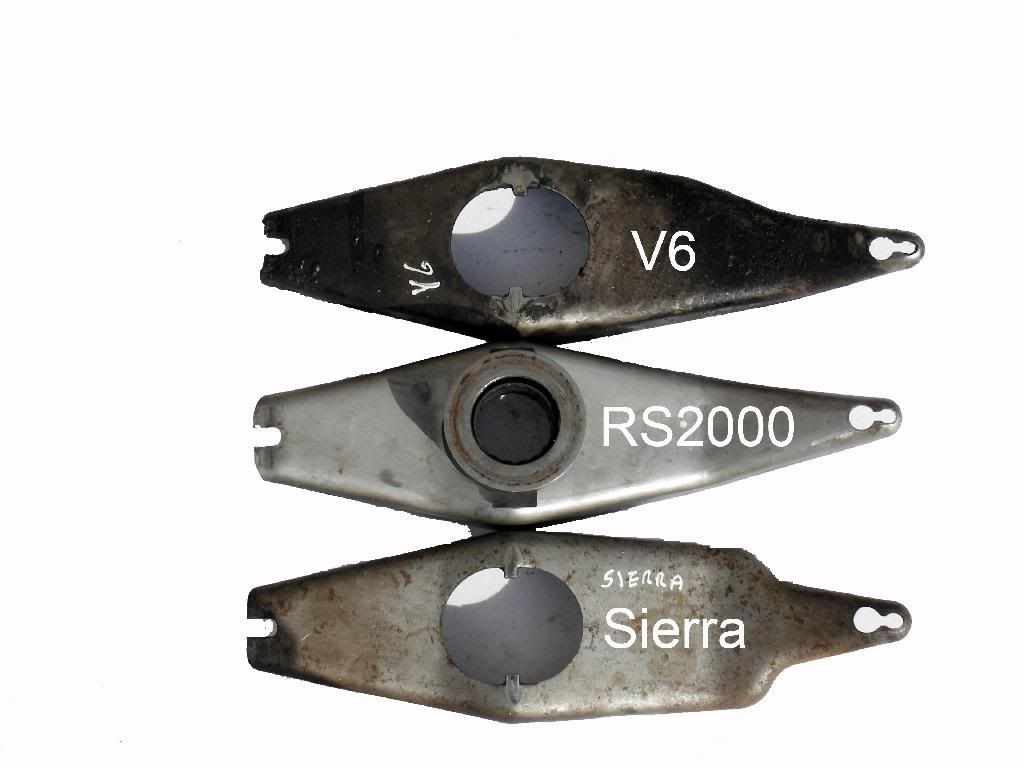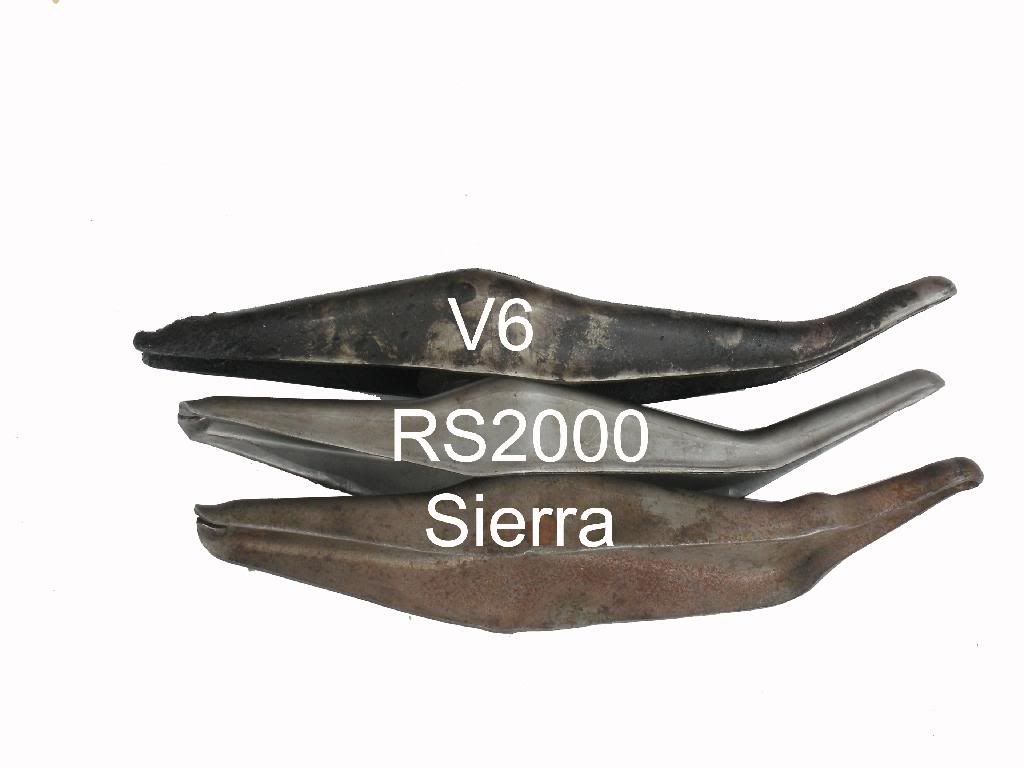I noticed no fever able difference when swapping bell housings and clutch arms



I'm still trying to sort the heavy clutch on my Fury, and having fitted the proper Pinto clutch and Dunnell lightened flywheel and finding it
still very heavy, I'm now down to only the bellhousing being slightly non-standard, as it has an RS2000 bellhousing and release arm.
Does anyone know if the RS2000 bellhousing / release arm are any different in dimensions / pivot point / pivot to release bearing distance etc...?
Anything that might make the clutch action heavier using the RS2000 bellhousing?
thanks
James
Can't say I noticed any difference with my clutch when I converted from a standard bell housing to an RS item but I don't have a Zetec
I replaced my cast iron type 9 bell housing with the Ali rs2000 item. Clutch release arm is very different, in fact the type 9 didn't fit at all!
When you say it's very different, do you know if the pivot point is in a different place or closer / further away from the release bearing?
Different length, different pivot point. Can't remember which way cause it was ages ago. All I remember was having to buy the correct rs2000 one.
There were 2 different length bell housings, V6/4x4 and a few others had a long input shaft and bell housing and escorts cortinas had a shorter shaft and bellhousing. Not 100% sure what the rs2000 was though.
What I'm trying to determine is whether using a standard bellhousing will mean that the clutch arm pivots closer or further from the centreline
of the shaft, therefore making the clutch action heavier or lighter.
I *think* that if the pivot is closer to the centreline then that would make the clutch action lighter, as you would have more of a lever advantage on
the cable side of the clutch arm?
What clutch release bearing are you using? I ask as I know from experience if it is too short the release arm angle goes wrong and makes the clutch heavy. I believe the arm wants to start a bit "back" from the vertical plane, and travel through vertical to end up pointing slightly towards the flywheel.
Aha well I did notice that - I got a new Pinto release bearing from Burton power , but it is about 1cm shorter that the bearing that came off with the
old clutch, although I've no idea what bearing that is.
I was looking at the angles on the release arm today while trying to work out what could make it so heavy, but I couldn't see how the longer
release bearing would make it any different, it just looked like it would start with the release arm further away from the flywheel.
I think I'll try it with the old release bearing back on and see if its any different.
Thanks for all the help btw guys!
Have uploaded a couple of pics that might help
To all intents and purposes the pivot point is the same
I noticed no fever able difference when swapping bell housings and clutch arms


quote:
Originally posted by jameskett
Aha well I did notice that - I got a new Pinto release bearing from Burton power , but it is about 1cm shorter that the bearing that came off with the old clutch, although I've no idea what bearing that is.
I was looking at the angles on the release arm today while trying to work out what could make it so heavy, but I couldn't see how the longer release bearing would make it any different, it just looked like it would start with the release arm further away from the flywheel.
I think I'll try it with the old release bearing back on and see if its any different.
Yeah those images make the standard and RS2000 arms look identical in terms of size , pivot position and the end angle. Thanks for those, no point
trying a standard bellhousing then I don't think.
The typical arrangement for a type 9 to Zetec seems to be a 1.8 zetec flywheel redrilled to fit a Pinto coverplate (which as far as I can tell is what
the Dunnell flywheel is, albeit lightened also) , with a 2L Pinto clutch cover and friction plate.
I've seen mention of various release bearings, and I still have the old longer bearing from the previous clutch, so I'll fit that today and
see if the weight of the clutch action changes. As far as I could tell last night while staring at it for a couple of hours it would move the end of
the release arm perhaps an inch or two backwards away from the bellhousing, but I didn't consider that changing that angle might affect
weight.
Hope it does! I'm getting a bit fed up with changing stuff now.
Zetec, RS2000 bellhousing (and proper release arm) and Raceline or Burton steel flywheel in mine. The clutch is a standard genuine Ford (but marked
with Valeo and LUK part numbers) Sierra DOHC item that fits the Pinto bolt pattern and its very light to use, much lighter than many road cars I have
driven. Been in almost 15 years now with no issues. Cheap as chips, been on the track etc. Argument was if it will work with a heavy Sierra it will
work fine in a lightweight 7.
The other thing to note is the leverage ratio at the pedal, that will also make a difference.
Paul - if you get a spare minute, would you be able to measure the distance from the pedal pivot to the cable connection or your clutch pedal please?
My car has the standard Fury pedalbox so I'm a bit stuck with adjusting the ratio, but given that loads of Furys are around and presumably fine I
am hoping the pedal itself is not at fault.
re: the release bearing
back when I was thinking about a zetec I remember reading a lot of folk were using the release bearing from a Capri (1.3/1.6, 72-84, QH part no.
CCT133) - this was to suit the mondeo 1.8 clutch though I believe - but maybe that's what your old one is ?
Yeah looks like I've got the wrong release bearing in
Looking at this image :
http://s274.photobucket.com/user/Bonzoronnie/media/100_0429.jpg.html
Apparently the 133 bearing on the right - that matches the old bearing that i have, and the one on the left matches the new bearing. Ugh, gearbox off
again today then I think.
quote:
Originally posted by jameskett
Paul - if you get a spare minute, would you be able to measure the distance from the pedal pivot to the cable connection or your clutch pedal please?
OK no problem 
Swapped the release bearing and it's bit better, but still heavy and sort of springs out suddenly in the last inch or 2 of travel.
So I tried moving the cable to a hole I'd already drilled in the pedal about an inch higher up (closer to the pivot) - with the old release
bearing this didn't really work either, but with the correct release bearing it makes the pedal super light, so I'm pleased with that.
The only issue of course is that the top of the pedal now moves further - I have a 1:1 scale wooden mockup and it appears that the top rear of the
pedal would contact the pedalbox end panel at about the point where the clutch releases the drive plate. I *think* it would still work, certainly it
seems it would if I took some material off the rear edge of the pedal, but I want to be 100% sure before I refit this lot into the car, so I am now
making a test angled pedal from ali to see if adding a slight angle change gets it to work nicely within the available space. I can also add some more
cable mount holes to test different weights / travels.
If it works then I can try to get it made up in steel (or else use the ali one if it seems strong enough).
thanks again for the help guys, I am getting there slowly!
[Edited on 2/11/15 by jameskett]
My mockup seems to have worked, with a very rough aluminium pedal with a variety of cable link holes in it I've managed to get what seems to be a
decent balance between pedal weight and travel.
I expect once I get it all back in the car nothing will work 